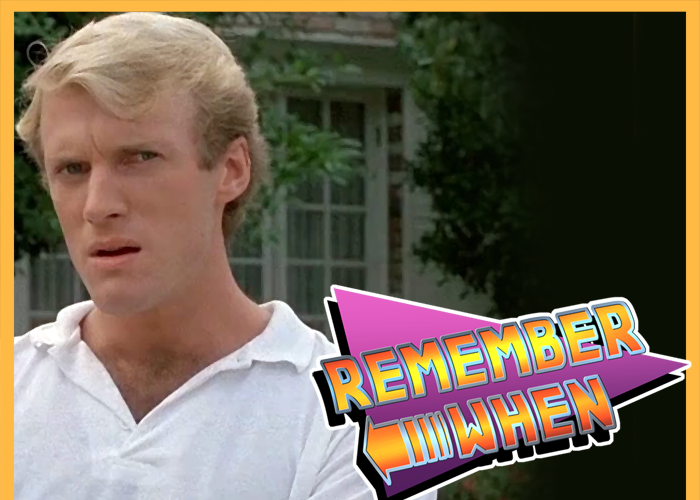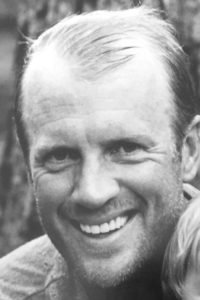 We look back fondly on a great number of movies from the 1980s. As latchkey kids who were partly raised by cable television following its revolutionary introduction, we would watch movies over and over and over again until we knew every nook and cranny of the HBO rotation. “Real Genius” was one of those after school mainstays, a comedy that we were probably too young to fully understand, but we embraced it with open arms anyway.
We look back fondly on a great number of movies from the 1980s. As latchkey kids who were partly raised by cable television following its revolutionary introduction, we would watch movies over and over and over again until we knew every nook and cranny of the HBO rotation. “Real Genius” was one of those after school mainstays, a comedy that we were probably too young to fully understand, but we embraced it with open arms anyway.
In the film, Robert Prescott plays Kent, an insecure graduate assistant who becomes the most unlikely of cinematic bullies, and apparently, one of the “biggest dicks of Hollywood.” And while he has amassed plenty of credits over the years, including “Bachelor Party” and “Spaceballs,” he remains a part of our pop culture past due to his genius “Real Genius” performance, a role that we continue to quote to this day.
We recently sat down with Prescott to discuss why the film stands out from other 80s teen comedies, a pattern of being cast as preppy conformists, and how volunteering at Ground Zero following the attacks of September 11, 2001 impacted his career forever.
TrunkSpace: As viewers, we take a movie like “Real Genius,” or a movie like “Bachelor Party,” and we attach this nostalgic label to it in our minds. Our relationship with those projects is ultimately different than yours in that we remember the finished product while you probably remember the overall experience. So with that said, what is your relationship to those films?
Prescott: Well, “Bachelor Party” came before “Real Genius,” by about a year, and “Bachelor Party” was actually my second job out of the gate. I was in New York, studying acting, and I got cast for a movie that was shot in Los Angeles, and it was called… well, actually, it was first called “National Lampoon’s Joy of Sex,” but, when National Lampoon saw it, they bought their name back, it was so bad.
TrunkSpace: Interesting. We had no idea that was originally connected to the National Lampoon brand.
Prescott: Yeah. That’s what took me to Los Angeles, and, while I was there, I auditioned for “Bachelor Party,” and I got that, and then I just realized that, “Wow, I might have a career out here.” It sort of happened quickly for me and it was an exciting time. So, I did “Bachelor Party,” and I think with those first jobs, the learning curve is so steep. It’s just incredible. I guess coming out as I did from New York, having no real concept of how careers work, or the business, or any of that, I did not consider that I was going to be like the angry preppy – the angry yuppie guy. It caught me off guard, but, in retrospect, it makes perfect sense, because there was this whole, huge wave of movies right after “Animal House” that were like the anti-heroes, and the preppies and the conformists were the antagonists. It did catch me a little bit off guard, but still, work is work. And when I got cast in “Real Genius,” I thought, “Uh oh, is this a pattern?”
But “Real Genius,” I thought, really had a heart to it, and even the character of Kent had a heart. It was different. It wasn’t quite as exploitative, or a by-the-numbers-teen-comedy, like a rip-off of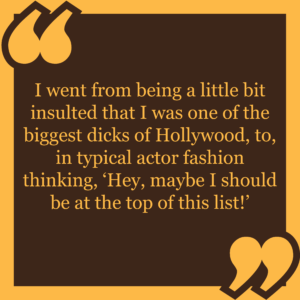 “Animal House.”
“Animal House.”
TrunkSpace: And the thing about Kent was, he wasn’t your stereotypical 80s teen villain. He was, in a way, stuck in a tough place himself. He wasn’t the stud or the jock or the one guaranteed success.
Prescott: Right, right. And it was fun. It was a fun character. The first job I did was “Joy of Sex,” directed by Martha Coolidge. She’d just directed a movie called “Valley Girl,” which got her a lot of attention – a low budget movie that made a lot of money, and it had a nice heart to it too. And so, when she got a bigger job with “Real Genius,” she asked me to audition, and I came in and read for a few parts, and wound up with Kent. I hold her, in large part, responsible for that movie having mostly sympathetic characters that you could identify with, instead of just making them run of mill.
TrunkSpace: It was a time when teen characters, or characters in comedies in general, became caricatures in a lot of ways, but that wasn’t the case with “Real Genius.”
Prescott: Not as much, no. No, it really didn’t, and, like I said, I credit her and I credit the last writer who was on set, his name was Pj Torokvei. He’s a Canadian guy, and he was funny, and he was really good for that script. I think he really humanized it.
TrunkSpace: For people of a certain age, that film kind of existed and lived on through HBO. In your opinion, did cable help make that movie more iconic than it would have been?
Prescott: Oh, my God, yeah. It really did, and I remember those days too – you’d turn on cable and see the same movie come up over and over again. I was in my mid 20s then, so I wasn’t coming home from school, hanging out with my buddies, and just flipping on the TV, watching movies over and over again like I would have done in junior high and high school. But, to this day, every now and then, somebody will come up to me, and I’ll realize that they saw that movie like 30 or 40 times, and it means so much to them. And I get that, I totally get that, and it’s amusing and flattering too. I feel good about it, because, like I said, the movie had a real core, a heart to it.
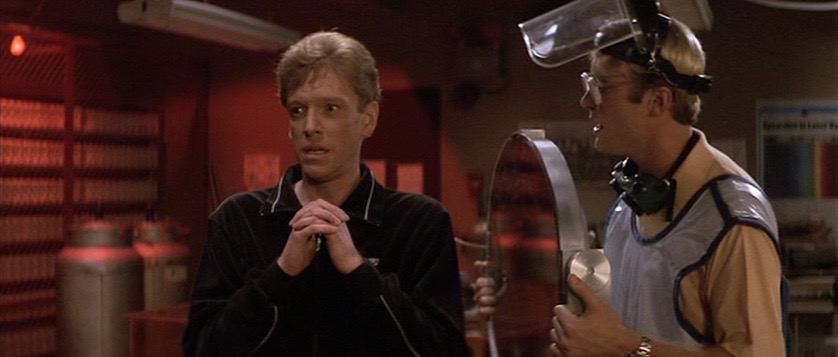
TrunkSpace: With that said, do you feel like you have left your mark on pop culture?
Prescott: Well, I’d like to in a small way, but it’s a small way. It’s funny, a friend of mine, this wasn’t that long ago, he was in a waiting room at his dentist’s office. He calls me up and he says, “Hey, Prescott, you’re in the Top 10 Biggest Dicks of Hollywood.” (Laughter) I was like, “What are you talking about?” “Yeah, you’re one of the biggest dicks in Hollywood.” And I thought, “Wait a minute…”
What’s funny is they did a list of those 80s antagonists, whatever the deal is, and there was the guy who broke Ralph Macchio’s knee in “Karate Kid,” and there were a few others, and I remember I went and found the article, and I thought, “How did this guy get in front of me?” I went from being a little bit insulted that I was one of the biggest dicks of Hollywood, to, in typical actor fashion thinking, “Hey, maybe I should be at the top of this list!” (Laughter)
But to answer your question, no, I recognize that there is a segment of people, who are your age now, who do see certain roles… they saw Kent so often, or the character in “Bachelor Party,” Cole, so often that within a very small segment, there is a, kind of like, iconic aspect to it. I don’t take it… I mean, it’s a small segment, but it’s very amusing to me, and flattering too.
TrunkSpace: “This is God, stop touching yourself,” has been quoted probably far more times than one would think.
Prescott: Exactly. I mean, we didn’t give it any second thought, but when you’re making a movie, it’s almost impossible not to think that you’re doing something really good and special that’s going to stand out, and we did, making that movie, and it was a good group of actors in the set and the crew. Martha Coolidge always made the set… it had a really good spirit, so it’s hard not to feel like you’re doing something that’s going to last a little bit or stand out. As far as those individual scenes and stuff, yeah, some of them were kind of special, like the ice in the hallway, and the popcorn thing was pretty big. It was a fun movie.
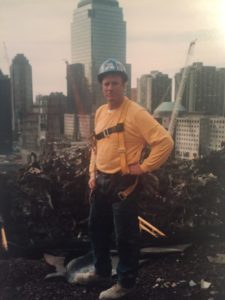
TrunkSpace: You started out in theater and then moved into film and television. Is it difficult to start out on the stage and then move to film and TV where it’s less of an actor’s medium and more of a director’s and editor’s medium?
Prescott: I don’t think it’s that difficult. I mean, acting is acting and in stage and television, it is fragmented, and you give it away at the end of the day and leave it up to the director and editor and everyone else. They can mull over your performance, but it’s all the same. It is acting, and you have to have some insight into charting a performance if you’re doing a movie that’s shot out of sequence, and that takes a certain type of insight and awareness, but it’s not that complicated, you just have to have a little bit of common sense. You approach the work, pretty much, the same way. On a movie, between action and cut, it can be very short, but so can a scene in a play. You might run on and run off, so, in a way, it’s the same thing. You prepare, and then do what you set out to do.
TrunkSpace: Do you feel like as you’ve gotten older, as you’ve lived more life, it has become easier to find characters because you’ve experienced more?
Prescott: I don’t know. That’s a good question. On the one hand, yes, but I think as I’ve gotten older, you settle into your own skin, and so, sometimes, doing a character who is dramatically different in temperament and personality than myself, can be even more of a challenge, because, when you’re younger, you have a more “I can do anything,” attitude.
TrunkSpace: You stepped away from acting for some time. Can you tell us about that?
Prescott: I did step away from it in 1993, and then, in 2001, I went down to work at Ground Zero as a construction worker, and since then, within a few years or so, I started having health issues. It’s been, for a while now, I’ve been struggling with those, and doing some acting, and recently, I’ve been addressing those issues by doing some radical changes in my diet and living. I feel that, perhaps, that I can get on top of these conditions. I’ve been going to Mount Sinai hospital for 15 years now, as a result of the WTC Health Program, and all these things have affected my life. I still do a little bit of work. I just had a scene in a Denzel Washington movie that’s coming out next month. I still have my foot in it, but not to the same degree. I’ve learned to, and accepted that, my career, such as it is, has been affected by this.


